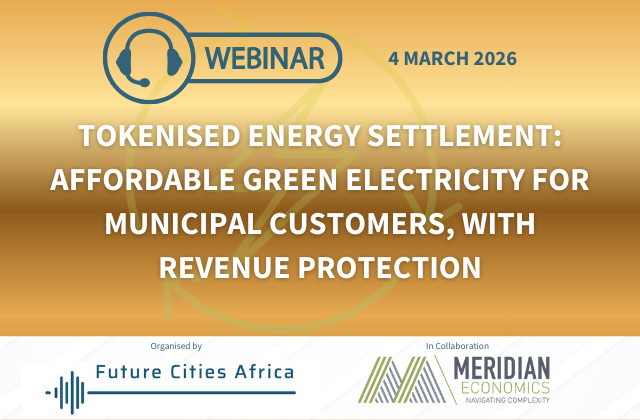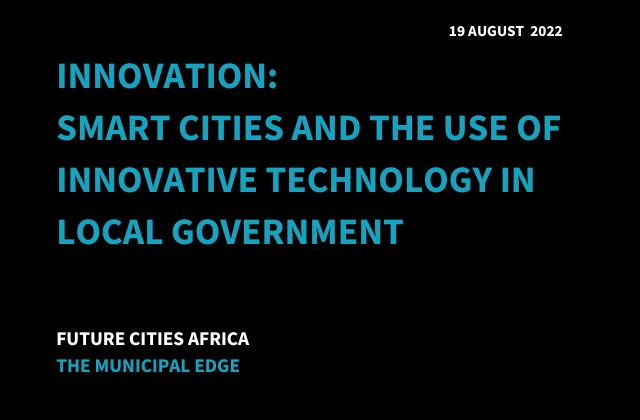Reimagining Local Governance: Unpacking The 2026 Local Government White Paper
Hosted by Future Cities Africa and The Municipal Edge
Stay Connected
The discussion, moderated by Mr. Zolani SS Zonyane, Editorial Director of The Municipal Edge, featured a distinguished panel of experts: Dr. Lungelwa Kaywood (University of Stellenbosch, Faculty of Law), Professor Mpilo Ngubane (Institute for Local Government Management), Mr. Lulamile Mapholoba (Municipal Manager, Knysna Local Municipality), Mr. Daniel Nolte (Advisory Board Member, CIGFARO Research and Advisory Centre), and Mr. Philip de Bruin (Managing Director, Business Engineering).
The webinar sought to raise awareness, empower stakeholders, and encourage public participation in the White Paper review process, with submissions due by June 30, 2025.
Thank you to our Sponsor
The webinar sought to raise awareness, empower stakeholders, and encourage public participation in the White Paper review process, with submissions due by June 30, 2025.
Thank you to our Sponsor
Business Engineering
Contact them: 0860104888 | admin@be.co.za | www.be.co.za
Key Themes and Insights
-
Historical Context and the 1998 White Paper
Dr. Lungelwa Kaywood provided an overview of the pre-1994 local government system, characterised by racial segregation, unequal service delivery, and underfunded black municipalities. The 1998 White Paper aimed to address these issues by establishing a developmental local government framework with goals of universal service delivery, democratic participation, and fiscal sustainability. Despite achievements like democratic representation and expanded services, it faced challenges due to unrealistic revenue assumptions, persistent inequalities, and structural flaws, necessitating a review after 25 years. -
Current Challenges in Local Government
-
Financial Crisis: Municipalities are financially unsustainable, with municipal debt escalating from R309 billion (June 2024) to R386 billion (September 2024). Over-reliance on own revenue (projected at 70% but often below 50%) and a culture of non-payment, including by government departments, exacerbate the crisis.
-
Service Delivery Gaps: Universal access to affordable basic services remains elusive, with rising costs eroding the social wage and deepening poverty.
-
Overregulation and Compliance Fatigue: Municipalities face a heavy regulatory burden, diverting resources from service delivery to compliance. Incompatible legal requirements and policy directives create inefficiencies.
-
Politicisation and Lack of Professionalisation: Mr. Lulamile Mapholoba emphasised excessive political interference, unqualified appointments, and weak enforcement of ethical codes, undermining service delivery and public trust.
-
Structural Issues: The 'schizophrenic' design of local government, balancing autonomy with national/provincial oversight, creates tension. The relevance of 257 municipalities, including 44 district municipalities, was debated, with calls for consolidation or reconfiguration.
-
-
Proposed Reforms for the 2026 White Paper
The panel discussed nine priority areas outlined in the discussion document:-
Fiscal and Financial Reform: Reassess the funding model, balancing own revenue with national transfers, and explore innovative financing options like tourism levies or congestion charges.
-
De-politicisation and Professionalisation: Establish a robust professional body to enforce standards and reduce political interference in appointments.
-
Community Engagement: Strengthen public participation and restore trust through transparent service delivery.
-
Intergovernmental Collaboration: Enhance cooperative governance and oversight at national and provincial levels to reduce fragmentation.
-
Spatial Inequalities: Address persistent spatial planning challenges rooted in apartheid-era policies.
-
Climate-Responsive Governance: Integrate climate adaptation into infrastructure planning, citing examples like Cape Town's disaster budget allocation.
-
Traditional Governance Integration: Improve synergy between councils and traditional authorities.
-
Ethical Accountability: Combat corruption through consequence management and penal clauses in legislation.
-
Technology Adoption: Leverage digital platforms, AI, and automation to improve efficiency, despite challenges like apathy and overregulation.
-
-
Call to Action
The panel stressed the importance of public participation in the White Paper review, urging citizens, officials, and stakeholders to submit comments by June 30, 2025. The process is an opportunity to co-create solutions, leveraging 25 years of empirical evidence to redesign a local government system that is financially viable, professional, and responsive to current realities.
Notable Proposals
-
Consolidation of Municipalities: Mr. Mapholoba and others suggested reducing the number of municipalities, particularly district municipalities, to enhance efficiency and resource allocation.
-
Decentralisation Review: Reassess powers and functions to ensure municipalities are adequately resourced for devolved responsibilities.
-
Professional Body: Establish a powerful professional body, similar to the Legal Practice Council, to enforce standards and deregister non-compliant officials.
-
Technology and Shared Services: Mr. Daniel Nolte proposed district-level municipal entities to centralize professional expertise and systems like GIS, addressing capacity gaps in rural areas.
-
Regulatory Simplification: Streamline compliance requirements to free up resources for service delivery.
Conclusion
The webinar highlighted the urgent need to reform South Africa's local government system, which grapples with financial, structural, and ethical challenges. While the 1998 White Paper laid a foundation for developmental governance, its limitations and evolving socio-economic realities demand a bold, evidence-based overhaul. The 2026 White Paper review offers a chance to restore public confidence, enhance service delivery, and build resilient, inclusive municipalities.
Stakeholders were encouraged to actively engage in the process to shape a local government that fulfils its constitutional mandate.
Stakeholders were encouraged to actively engage in the process to shape a local government that fulfils its constitutional mandate.



